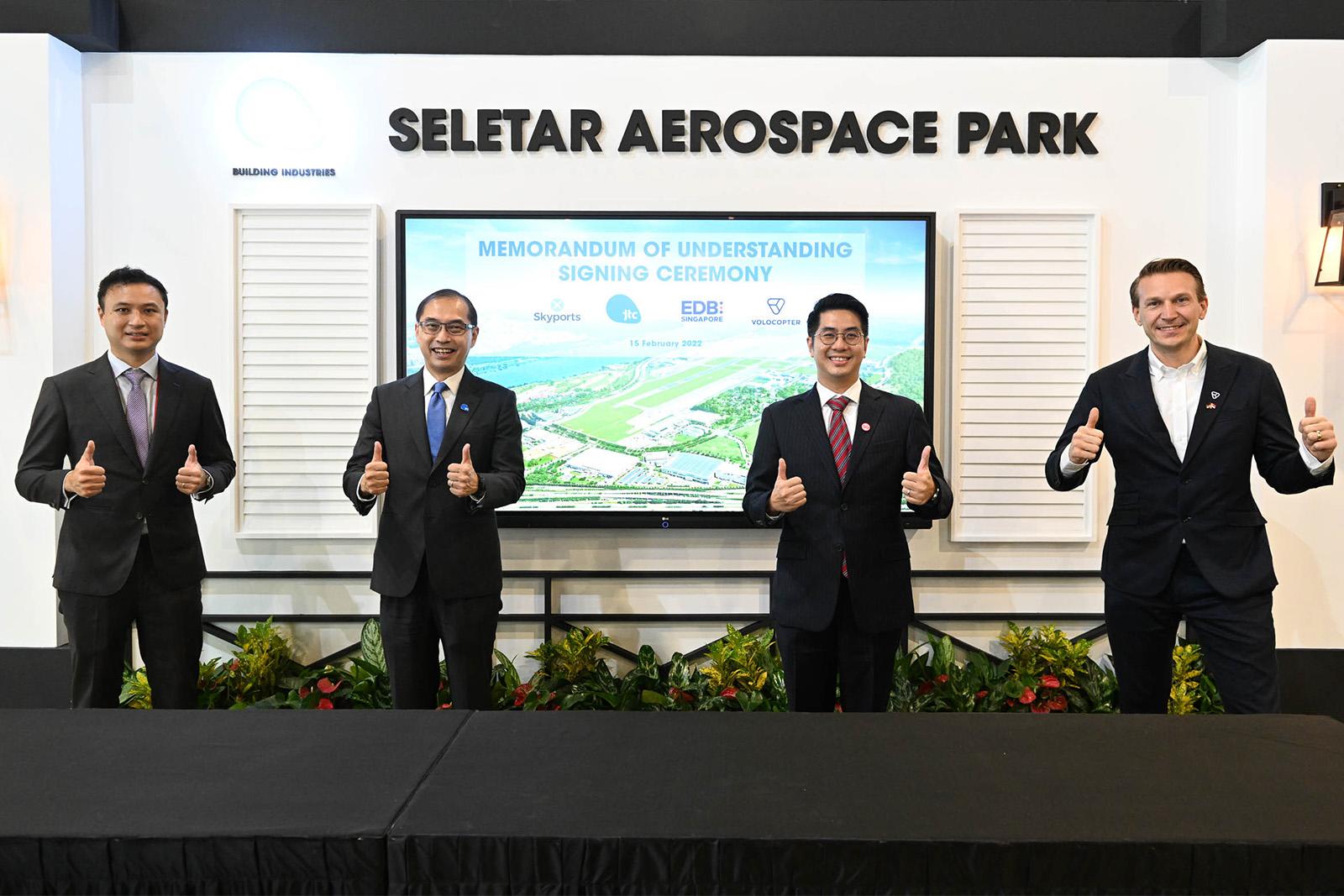
SINGAPORE—With Singapore an increasingly key element of its electric vertical-takeoff-and-landing growth plan, German startup Volocopter has signed agreements with the island state’s government to establish an advanced air mobility hub at Seletar Aerospace Park.
The plan was agreed on with the signing of two memoranda of understanding between Volocopter and UK-based vertiport developer Skyports with JTC, the Singapore government’s planning agency, and the Singapore Economic Development Board (EDB).
Under the agreements the parties will explore ways the aerospace park can support the growth of the emerging advanced air mobility sector in Singapore. In particular, the study will examine the feasibility of developing facilities and resources in Seletar to carry out manufacturing and maintenance, repair, and overhaul activities for electric vertical-takeoff-and-landing (eVTOL) vehicles.
Volocopter has revealed plans to build up to six vertiports in Singapore by 2030 to provide both tourist and air taxi flights within the city-state, as well as cross-border connections to neighboring Indonesia and Malaysia. The company outlined its plan in a road map for the launch of urban air mobility (UAM) operations in the island, released at the Singapore Airshow.
The road map forecasts Volocopter’s UAM services will provide S$4.18 billion ($3.1 billion) in economic benefits to Singapore by 2030. These include S$670 million in direct benefits from ticket sales for tourist trips and S$1.12 billion for cross-border flights. Indirect and induced benefits make up the rest.
Volocopter plans to begin services in 2024 with tourist flights over Marina Bay. This is to be followed by tourist flights over Sentosa island. The company then plans to launch air taxi flights to Indonesia and Malaysia from Marina South in the medium term and Singapore Changi Airport in the longer term.
Being the operator, as well as the builder, of the vehicles is a key element of the company’s business plan, says Volocopter Chief Commercial Officer Christian Bauer. “When you look at the value chain in operations, it is important to us to have the interface to the customer when they book a flight. Secondly, it’s important that we also have control over the flight operations and maintenance. Monitoring the technical functionality of the vehicles will give us the data to improve our service.”
Although initial operations will be piloted, Bauer hopes Singapore authorities will permit the start of autonomous operations within a few years. “We believe first authorities will be ready in 2025 or 2026 to allow for autonomous operations. But we will see how that develops, because you need a lot of data to prove that the system is capable and working safely,” he says.
The German startup plans to certify its VoloCity eVTOL air taxi by the end of 2023. This piloted multicopter can carry a single passenger 30 km (19 mi.) at up to 90 kph (56 mph). As a follow-on, Volocopter is developing the four-seat VoloConnect, designed to fly 100 km at 180 kph.
The company is working with Skyports to develop the VoloPort infrastructure and is looking at sites in Marina South, Sentosa and Changi Airport. The companies cooperated on the October 2019 piloted demonstration of a Volocopter over Marina Bay. This included a prototype VoloPort.
A typical journey by car from Changi to the business district of Johor Bahru in Malaysia can take more than 3 hr., the report says. A VoloCity flight would take 30 min. Travel to the special economic zone in Batam, Indonesia, also can take up to 3 hr. by ferry. A VoloCity flight would take less than 20 min.
In consumer studies conducted by Volocopter in Singapore, 72% of those surveyed expressed high interest in flying in an eVTOL, the road map says. “Notably, piloted flights are preferred over autonomous flights by a significant margin,” the document adds.
Volocopter has committed to Singapore as one of the first cities globally—and the first in Asia—where it will launch commercial UAM service. The company is also working with Malaysia Airports and Skyports to study the feasibility of vertiport deployment in Malaysia.
Volocopter additionally has a joint venture with Aerofugia, a subsidiary of Chinese automaker Geely, to launch UAM service in China. The company has committed to flying in Japan during the Expo 2025 Osaka Kansai and partnered with ride-hailing platform Kakao Mobility to study the feasibility of UAM in South Korea.


